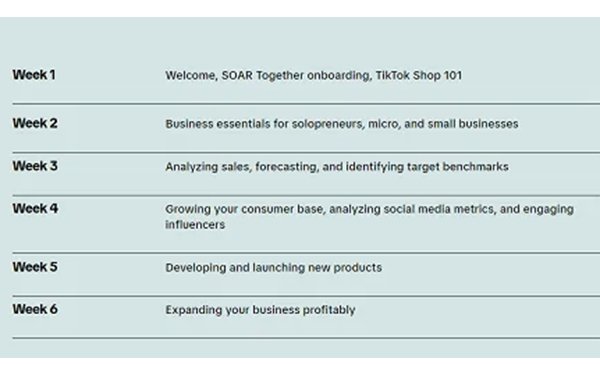
Despite facing a potential banin the U.S., TikTok remains dedicated to American
small-business expansion and their ability to push product sales on the app.
The ByteDance-owned company has therefore launched two new funding and training initiatives focused on the growth
of small and medium-sized businesses (SMBs) that are interested in selling their items through in-stream TikTok Shop displays.
“Supporting Our Artisans and Retailers Together”
(SOAR) is split into two retailer-focused social impact initiatives, which aim to provide support for women-owned and LGBTQIA+-owned businesses.
TikTok is running a six-week-long Shop
accelerator with 15 U.S. businesses owned by women.
The participants will be invited to a series of courses hosted by entrepreneur and brand-builder Tina Wells’ Conscious Commerce
Accelerator and the Association of Women's Business Centers.
advertisement
advertisement
According to the social media company, courses will cover a variety of business skills, including sales review and forecasting,
social metrics analysis, influencer engagement strategies, profitable business expansion tactics and more.
The company has also partnered with StartOut, a nonprofit organization devoted to
helping LGBTQIA entrepreneurs, for a program supporting 30 businesses in the U.S. with scholarships for StartOut’s Founders Program, where TikTok says participants will gain insights on how to
grow and scale their business via resources, mentorship, and networking opportunities.
TikTok has used the proliferation of small businesses on its platform as a strategy to win over the
American public and combat the threatening legislation. In April, the company released an economic impact report that showed the app supporting 7 million U.S. businesses
and 224,000 jobs in 2023, while generating $14.7 billion for American SMBs.
In fact, the company claims its new women-owned business initiative was sparked by a finding from the impact report:
“more than three-quarters (81%) of young female entrepreneurs under 30 agree or strongly agree that to stay competitive their business needs to continue to use and improve upon their TikTok
marketing content.”
But while TikTok calls the kickoff of SOAR Together “a major step” in the company's efforts to address the needs of small businesses and creators, it
isn’t addressing the elephant in the room.
Seven months from now, the app could be banned entirely in the U.S. -- a possibility that the budding entrepreneurs and small businesses
selected for these accelerator programs may find troubling.
How much effort should a SMB put into the utilization of a platform that has a target on its back?